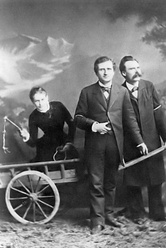|
A while back someone gave me a book on writing, which contained a number of random quotes by writers. As a historian, I am sometimes frustrated when presented with quotes that have been detached from their original context and passed off as inspirational or profound. So as I was flipping through the book, I came across this one that made me sit up and take notice: "The author must keep his mouth shut when his work starts to speak." -Friedrich Nietzsche  So without knowing anything about Nietzsche, I might interpret this as a humble phrase. Let your work speak for itself. Perhaps, it is a warning. You must let others critique your work as they will, once it is out in the world. Do not answer your critics. Or maybe it is just a reminder to writers. Do not edit or self-censor as you write, but allow your work to emerge in the world in its most full and beautiful form. I assume because the quote was included in this writing book, and is oft-repeated (again, with no context) on many writing sites, that this admonition is seen as a virtue. Do words have meaning of themselves? Do they live, and change with the times? Or do they need to be ever-framed by the context with which they were first uttered? Consider the source of this quote. Friedrich Nietzsche. Nietzsche was a nineteenth-century German philosopher, philologist and poet, among other things. Such as being a megalomaniac. And a syphilis-riddled man who spoke frequently of his own genius. A man whose work inspired both Nazis and Fascists alike. Altogether, an intriguing--if tortured--soul. So what did he mean when he said this? As I indicated, it's very difficult to identify the source of this quote, so for all I know it is completely inaccurate and has just been repeated ad nauseam. Some digging for the past hour (which is about all the time I have to devote to this quest) has yielded little more context, except that I think, but can not be sure, that the quote appeared in the second edition of Nietzsche's first published book The Birth of Tragedy, in a new section called "Attempt at a Self-Criticism" (1888). Rather than being a true self-criticism, however, the statement is widely viewed by scholars as a means for Nietzsche to clarify his earlier views, and to impose his later thinking onto his earlier work. Such a revision could be construed as more arrogant than humble ("See how brilliant I was, even when I was a young man?") This additional context, to my mind, sheds a different interpretation on the quote. Should we just make sense of words ourselves? Or does the larger context matter? While there's a pleasing democracy about the idea that we can all interpret words for ourselves, for my part, I think, understanding the larger context almost always offers a more full and interpretation of words. But what do you think? [P.S. I also find it amusing how often the above quote by Nietzsche is used by authors, when it turns out that he actually did write "Rules for Writers" that are NEVER EVER quoted. Such as this gem: "Be careful with periods! Only those people who also have long duration of breath while speaking are entitled to periods. With most people, the period is a matter of affectation." Rich stuff indeed!] Image: Lou Andreas-Salomé, Paul Rée and Friedrich Nietzsche (1882)
2 Comments
|
Susanna CalkinsHistorian. Mystery writer. Researcher. Teacher. Occasional blogger. Categories
All
Archives
May 2023
|
 RSS Feed
RSS Feed